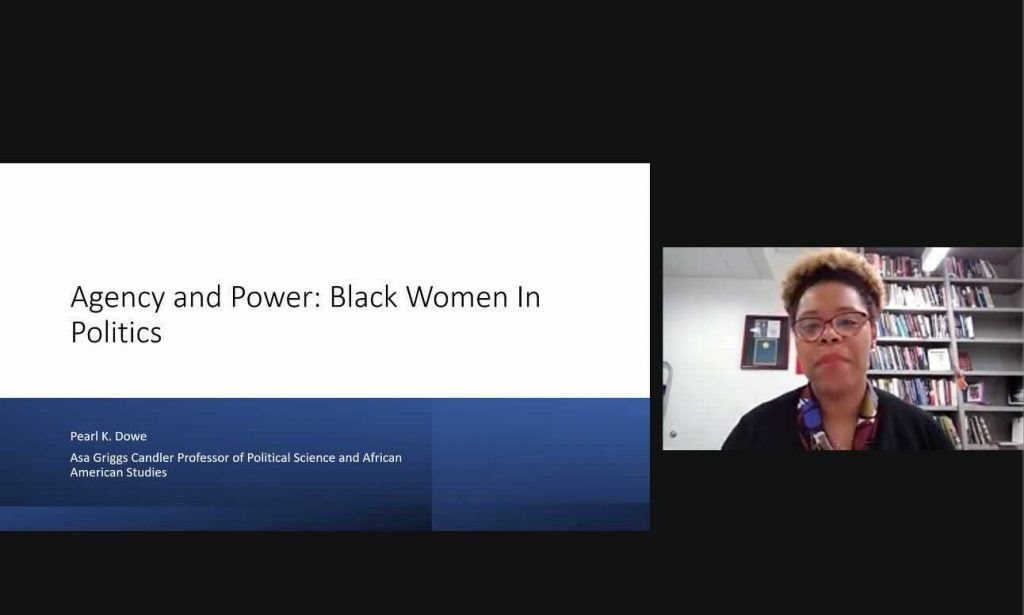“Black women’s radical imagination convinces them that individually and collectively they can change a world that tells them that they are less than,” said Asa Griggs Candler Professor of Political Science and African American Studies Pearl Dowe.
Every first Friday of the month at 4 p.m., Emory University highlights a faculty member’s research on race-related topics. On Nov. 12, Dowe presented her research on Black women in politics.
After a land acknowledgement, James Weldon Johnson Institute for the Study of Race and Difference Director Andra Gillespie introduced Dowe.
Dowe explained that her research examined why Black women run for public office despite encountering many obstacles. She interviewed 32 Black women who serve or have served as elected officials across the country. She also interviewed five Black women who work on campaigns and political parties as well as the national president of African American sorority Delta Sigma Theta.

Asa Griggs Candler Professor of Political Science and African American Studies Pearl Dowe presents about Black women in politics.
Using that research, Dowe’s model examines how the political socialization of Black women contributes to their motivation for running for office.
“Much of the recent work on political ambition of women concentrates on white women, and it often negates the lens through which Black women view themselves,” Dowe said.
She displayed a pyramid of socialization to outline her model. Using three layers — home, communal and political — Dowe outlined how Black women are encouraged to lead and change their communities while also having an obligation to the home.
Dowe noted that political socialization “looks different” for Black women. Specifically, the bottom layer, political socialization, explains that “Black women view political participation as a means to achieve equality and improve the status of the group.”
She then overviewed the trends she saw in the women she interviewed, beginning with a shared reluctance to run.
“Several of the women stated they were concerned about the fact that they were possibly going to run against white men who were going to have access to more money and were better known than them,” Dowe explained.
The women also shared a long history of volunteering in their community before running. Dowe said she could write two chapters just listing the women’s community involvement before running for office.
She continued by discussing the connection between Black women and the 2020 election.
“Politically, 2020 was a historic year,” Dowe said. “Not only did an unprecedented number of Black women seek political office, they were also at the forefront of voter mobilization efforts and head of political campaigns.”
She returned to the idea that Black women are socialized to see politics differently; while politics can be a source of ambition for some, Black women view it as a way to improve their communities.
Citing a quote from St. Louis Mayor Tishaura Jones, Dowe said, “Black women run to do something; men run to be somebody.”
When asked during the Q&A what motivated her to pursue this project, Dowe explained that she read two articles hoping white female politicians could flip southern legislatures. Dowe was skeptical of that, saying “why are we dismissing Black women as viable candidates?”
In addressing how her model explained hardship or failure in Black women’s candidacy, she expressed the importance of having agency in choosing when and what to run for. She explained that some of the women she interviewed found after failure, that “this may not be the best way for me to serve.”
Quoting sociologist Patricia Hill Collins, Dowe explained why Black women continue to fight in the face of failure, calling it “a culture of resistance.”
Gillespie asked what kind of political profile Dowe sees Black women having in the future. Dowe said she sees Black women in politics having a broader background, filled with less “elites.”
“I think we’re going to see more Cori Bush’s,” Dower said in reference to the progressive Missouri congresswoman.
Dowe also explained how she sees Republican-led redistricting efforts impacting Black female candidates. Black women tend to run as Democrats, so Republican redistricting could impact their campaigns.
“It’s going to be extremely challenging, particularly in this hyper-partisan climate,” Dowe said.
Dowe quoted Vice President Kamala Harris, encouraging Black women to continue to run despite the obstacles: “I have faith in the American people to know that we would never be burdened by the assumptions of who can do what, based on who has historically done it.
The post Emory professor Pearl Dowe discusses Black women’s important role in politics appeared first on The Emory Wheel.
